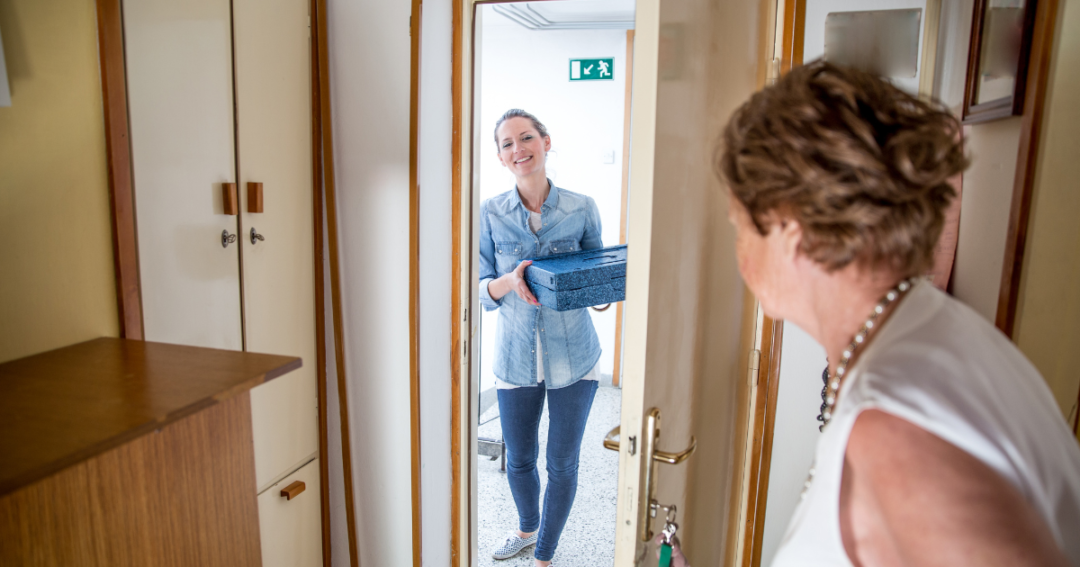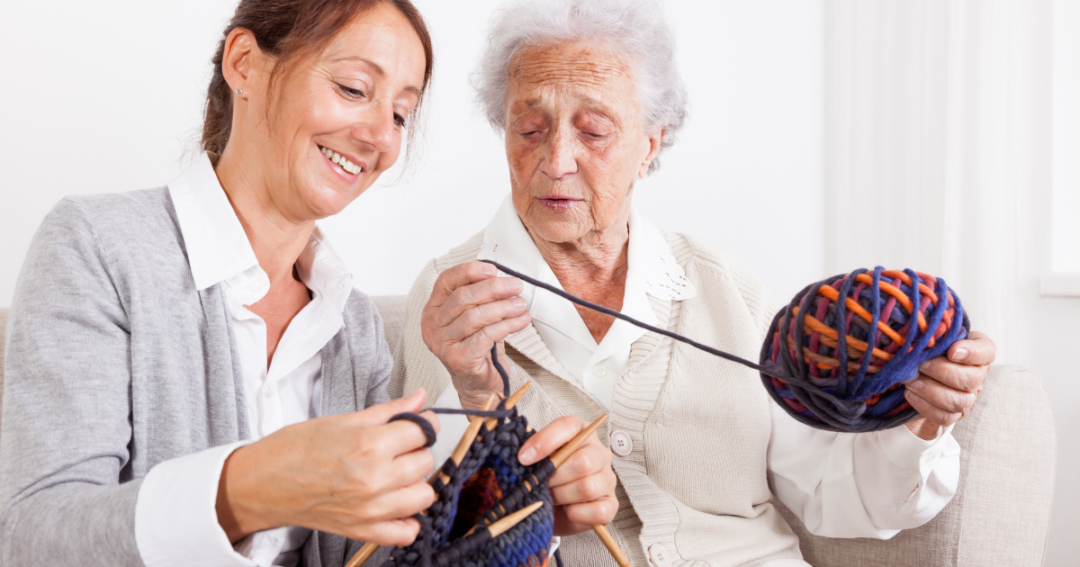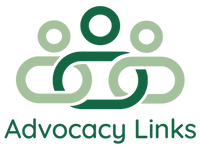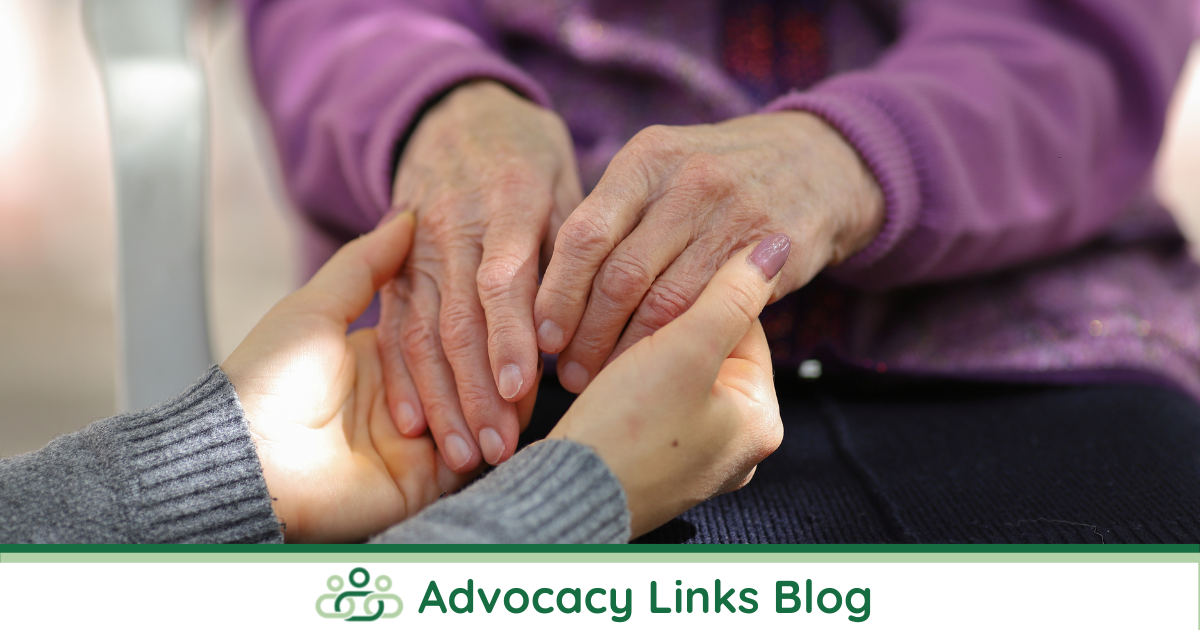SUPPORTING AN AGING LOVED ONE
Many of us understand and accept that, as we age, we will likely need support to stay independent in our homes. The first people who will see that we need help will likely be our loved ones. A spouse, a child, or a sibling may be the first partners helping us plan for our futures. They will take us to appointments or to pick up medications, help us make home modifications to ease our mobility challenges, or offer advice on how we can best plan our care.
Every aging adult’s priorities, needs, health, and financial abilities are different. While some are comfortable with family offering support, others may prefer professional care or social services to help them instead.
The common ground in these experiences is clear.
The processes of planning and setting up elder care is often confusing, difficult to access, and full of delicate situations and compromises. It is vital to have knowledgeable people helping support and guide you, and to find an area with easily accessible resources.

CAREGIVER EXPERIENCES
We spoke with two individuals who are helping family members stay independent in their homes. Both Marilyn and Julia are supporting their mothers with decision-making and planning. Here they share with us their experiences, and the things they have learned that they believe will help them prepare for their own care as they age.
Marilyn’s Experiences
- Who are/have you provided caregiver support for?
My siblings and I assisted with monitoring and caring for my father. He went into a nursing home after multiple falls and was there about two months prior to his passing. Dad was no longer able to care for himself, and we saw that his care was taxing on mom. He did not like being in the nursing home, but it was the best for the overall situation.
Now, I’m helping care for my mom. She went into the hospital after having multiple falls within 24 hours. As a family, we decided we needed to make her home more accessible for her while she was in the hospital. We made paths in the house so she could move around easily with her walker, rebuilt her steps, and added a rail. We also added some adaptive items like a bedrail and grab bars for her bathroom. We made sure she had a fall button. - How long have/did you help care or arrange care for them?
Dad’s health was failing for the last two years of his life. This was hard for him and those around him.
Mom’s health has been declining for many years. She has neuropathy in her feet that started in 2005, but she is still mentally sharp and aware. As her children, my siblings and I have stepped in to help navigate her needs more since Dad passed in 2016. It is very difficult for Mom to admit her limitations.
We have had more instances where we’ve had to step in and limit some of the things she can do for her own safety. For example, we made the decision that she should no longer be driving. Her eyesight is failing, and she is no longer able to feel her feet. This limits her ability to feel the gas and brake pedal. This decision was made around 2018 when she was in the nursing home.
We also talked to her for several months about the cleanliness of her home. We were persistent and she reluctantly agreed to have someone come in to clean a couple of times a month. Mom does not want anyone helping her with personal care or cooking, but she is losing strength, and this makes it hard for her to cook and prepare her meals. She agreed to use Meals on Wheels on a temporary basis, but we’ve decided that it is best if she continues with this service.
We have also stepped in to manage most of her finances. She struggles to manage her checkbook but still wants to have it. We’ve arranged for her bills to be paid through other means, but she keeps her checking account for family birthdays, Meals on Wheels, and to buy supplies for crafts or other projects she uses to occupy her time. - What has your experience been in helping her find support/services to assist with her daily life? Have you found these easily or have you struggled to find something that works for her?
Mom lives in a rural area and her access to services is limited. We could benefit from service coordination that would help with her medical needs. My other family members and I have divided up responsibilities for the different types of medical appointments that she needs to attend. We share information from these appointments with each other to help make sure she is relaying all the important information and to help each other be informed on what she needs.
Mom was recently denied home care that would have helped her wrap her legs every day. This helps reduce swelling. The denial was very frustrating as our family has not been able to do this daily. We work and have responsibilities in our own lives, and she is homebound. We did not get a clear reason for the denial, but we were able to find a workaround that seems to have helped. This causes everyone a lot of frustration and concern.
There is an increasing need for her to have assistance at home and but doesn’t usually agree that she needs this support. It can turn into a battle to try to get her to agree to these changes. - What situations have you encountered that are/were the hardest to navigate? (Services, mentally/emotionally, financially)
The hardest thing we’ve encountered is that Mom is resistant to having help. We have had to encourage her, and put some pressure on her, to make a lot of these changes. She feels they are unnecessary and taking away her independence, and we feel they are important for improving her health and safety.
Our only goal is to ensure she is safe. She wants to continue to live in her 3-story home. We’ve encouraged her to move to a smaller, single-story home that would be easier for her to care for and navigate.
There have been times when I have felt the need to step in to protect my other family members who live closest to her as well. They were struggling to help her care for her home. I work in the human services field and have helped aging individuals and their families make hard decisions as their health and mobility decline. When this happened, mom and I had a discussion where I had to emphatically tell her that things needed to change. I told her that if she does want to continue to live in her home, that was alright, but she needed to hire and pay people to do things like mowing the grass, cleaning the house, and perform maintenance, etc. - What have you learned that will help you prepare for your own care?
Being open to change is critical. Understand that limitations arise as one ages and be willing to adjust to those changes. Myself and my two living brothers have faced surgeries where we have needed to rely on others for assistance to get through recovery periods. It is humbling and not all of us have been able to handle it very well. We definitely have inherited some of our parent’s stubbornness!
Considering how we prepare financially is something we also discuss as siblings. My father made some really good decisions for protecting assets, but they were not prepared with insurance or cash to pay for extended care type settings.
As a family, we’ve recognized we need to consider all these areas and adapt them to our need so we can make it easier on the people who may be caring for us in the future. We’ve started to think about when/how we will downsize to smaller homes with better accessibility and we’re considering places with readily available resources like continuing care communities.
As a single person, I recognize that there are preparations that need to be made to avoid the hurdles that we have faced with Dad and Mom. It is present in my thinking often.

Julia’s Experiences
- Who are you caring for or supporting?
My Mother - How long have you helped care for or arrange care for her?
10+ Years - What has your experience been with helping her find supports/services to assist with her daily life? Have you found these easily or have you struggled to find something that works for her?
By working in the human services industry, I’ve been trained and prepared for this type of work. I know the processes and people with whom to connect. Connecting mom to resources and getting processes completed for applying for Medicare, Social Security, etc. was not difficult at all due to my professional experience.
My mother is very smart and generally plans ahead for things. Before she retired, she figured out how much money she would be receiving from Social Security and other retirement accounts/benefits. The entire year before she actually retired, she budgeted to live off of what she projected to make in retirement to ensure she would be able to meet her expenses. The remainder of her income from that year just went into her savings account so she could have additional funds for later use.
About 15 years ago, mom’s husband passed away unexpectedly, and she used that opportunity to get some of her own affairs in order. I helped her pre-plan her own funeral and update her will and end-of-life documents, etc. We signed her up for Medicare/prescription plans and worked out the details related to Social Security and minimum withdrawals from retirement accounts.
I have 4 siblings who trust and rely on me to make sure that things are “fine” with mom. They wait for direction from me about how they can best help. They know what I do for a living, so they assume I know what’s best & how to arrange it. None of my siblings work in the human services industry so they come to me for advice for themselves and they trust I’ll get everything in order for mom. I’m fine with this, and I don’t mind. It’s what I do.
While all my siblings are willing to help, we all have our own way of providing support that aligns with our personalities and skills. My sister and I live closest to mom and can get to her within 15-20 minutes if we get a call. (This sister also has a husband that is extremely willing to help at the drop of a hat.) I have a brother that lives farther away and due to that and his busy schedule, he generally stops by to visit her. He brings the grandkids and/or takes her out to eat when he’s in town. My other brother also lives farther away, but he’s been playing online computer games with mom as she’s picked up this interest lately. My other sister regularly has mom come to visit her to get her out of the house and socialize.
We have a good arrangement. I know that if I specifically ask my sister to stop by mom’s house on her way home from work to check on mom’s mental health (as my mom’s cat’s health is declining), I know she will. I also know that this sister will arrange with her husband to take mom to the vet when it comes time to help her cat cross the rainbow bridge. If I say, “We are all getting together on the first Saturday in September to help mom move to her new place in the continuing care community”, all my siblings will show up prepared to move boxes and haul furniture.
The weirdest part of this journey has probably been the response from people I speak with on behalf of my mom. Most organizations aren’t prepared for potential customers to know so much about their support, services, and available funding streams. A representative at the continuing care community mom was interested in was trying to explain the Aged & Disabled Waiver as a funding option for my mom and he was struggling with the explanation.
I told him he didn’t need to go over that because I was very familiar with it. He was again taken aback when I asked what the maximum capacity was for the campus to accept people with that funding source. (I knew that even though a facility says they accept that funding source, often they will only take a couple of people with it. If every resident there was solely funded on the Aged & Disabled Waiver, the campus would not be as nice as it is.) - What situations have you encountered that are/were the hardest to navigate? (Services, mentally/emotionally, financially)
Preparing for my own future care is going to be so much different than what I’m experiencing with my mother. I don’t have children. My spouse is 12 years older than me and is in significantly worse health. There’s likely nobody that’s going to step in and help me in my time of need.
I have learned that I need to go invest in a continuing care community placement as soon as I turn 55, which is when I’m eligible to live there. The price of the “independent living villa” is essentially the same price as an actual house. So, if I live in the villa for the next 20 years, then I’d have access to the big house, a housecleaner, maintenance workers, and health care workers when the time comes that I need that level of care.
I will also likely follow mom’s example for living off her proposed retirement income before she retired, especially if my husband is still alive.

TAKEAWAYS
Caregiver experiences are incredibly varied because those they are supporting almost certainly have different ways of approaching aging. Here are some valuable takeaways from Marilyn & Julia’s experiences as caregivers.
- Change is inevitable. These things sneak up on everyone, even if they have made plans. Be prepared to reassess if your plan needs to change. Being able to adapt as your needs change is an important part of making sure you get the support you need before something jarring happens that forces a change.
- Take an honest look at what support you actually need. Ask yourself “What would I want for my child or parent if they were in my situation.” Although it is a humbling experience that can be full of uncomfortable compromises, understanding your situation and what you can and can’t do safely is important for you and those who want to help you.
- Understand what you want and what you may need as you start to age and need additional support. Don’t be afraid to ask yourself these difficult questions before you need their answers. Ask yourself questions like: – What supports do I have that may be able to help? Family? Friends? Churches? Professionals?
– How can things be adjusted in a difficult situation to “make things work” safely? Home modifications? In-home care? Ride sharing for transportation?
– Who do I know that may have experience with these processes that could give me advice?
– Where will you go to ask questions when you need services, professional support, or are trying to navigate benefits programs? Prepare for your own independence by planning in advance as much as you can. - Listen to how your friends and family have navigated their own planning. Julia’s mother’s method of planning for the financial restraints of retirement by living off her anticipated retirement income, while she still had the safety net of her normal income, is a brilliant idea. It could ease the transition into a retirement income and help you see if you need to take additional steps to downsize or change your habits.
- Find people who know these systems and how to navigate them and ask questions. Both Marilyn and Julia came into the caregiver experience with knowledge from professional experience. This was incredibly helpful for them and their families, but not everyone has that type of experience in their family. Find the organizations and people that you trust. They can help guide you in the right direction to find the information and support you need.

If you are interested in finding someone who can help you find information on or guide you through elder care benefits, services, and supports, please consider reaching out to Advocacy Link’s Resource Connections. (You can call and leave a message at, 888-537-5733 or send an email to info@advocacy-links.com.) You and your family don’t have to figure it all out on your own from scratch, and we have professionals that can help you find and navigate resources to help address an individual’s set of priorities, challenges, and circumstances.

